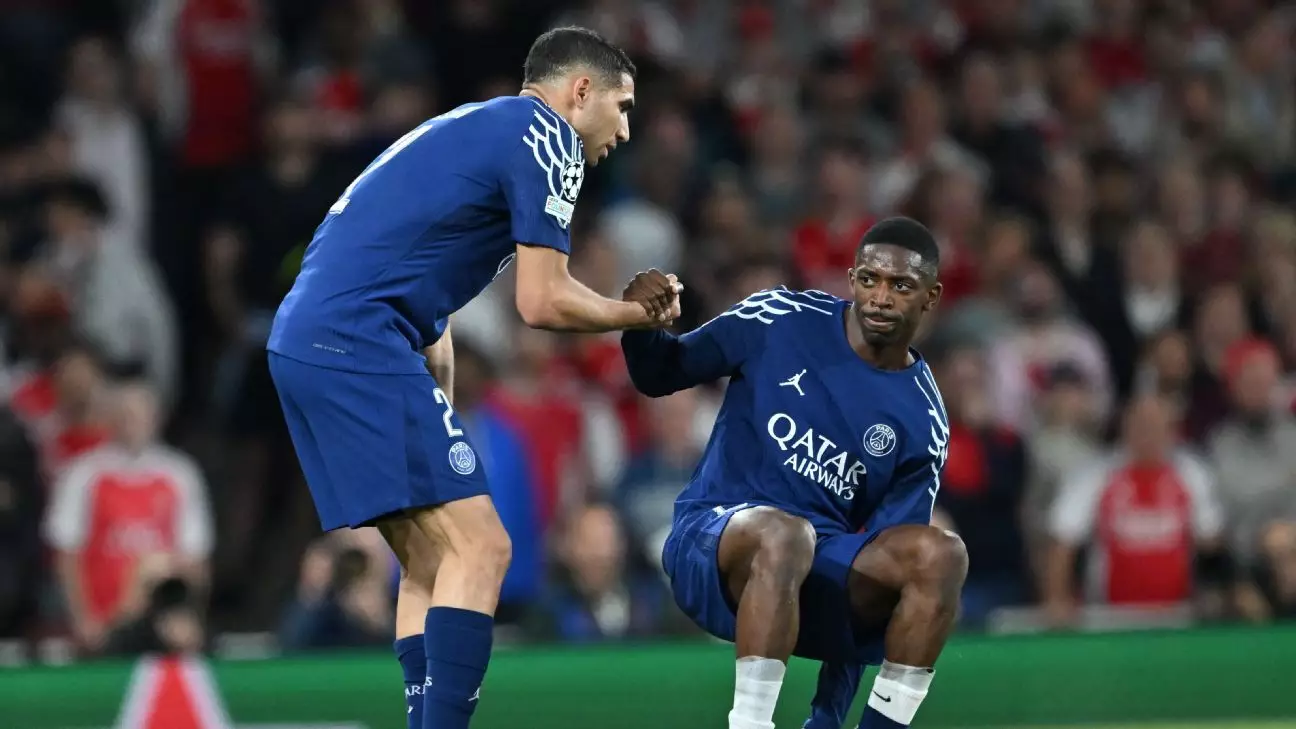As Paris Saint-Germain (PSG) strides toward its arduous quest for the UEFA Champions League title, the prospects have been illuminated, but not without shadows. Ousmane Dembélé’s premature exit during the first-leg semifinal against Arsenal raised alarms not just about personal liability but about the broader strategy of a team that has adapted swiftly to competing pressures. With his critical fourth-minute goal, Dembélé showcased the kind of intuition and skill that can change a match’s trajectory. However, his potential absence due to a hamstring injury means PSG cannot simply rest on a single player’s brilliance.
While the excitement around Dembélé’s prowess is justified, the resilience of the squad—ability to adapt under duress—cannot be overstated. Coach Luis Enrique’s assurance that the team can thrive with or without Dembélé reflects a strategy that centers on collective strength rather than individual reliance. The real question is whether PSG can pivot effectively in response to loss, maintaining momentum as they head into the decisive second leg.
Building a Team Culture
Luis Enrique’s statement, “We’re a real team,” carries profound implications. From the start of the season, a culture of unity and depth has been emphasized—each player is seen as integral, not replaceable. This is especially vital in high-stakes matches where unpredictability reigns supreme. The coach’s calm demeanor in addressing Dembélé’s situation resonates with a deep belief in the squad’s synergy. In this delicate phase of the competition, not only is skill needed, but also an unshakeable mental framework that prioritizes teamwork over individual accolades.
Donnarumma’s stellar saves against Arsenal stress the importance of other key players stepping up in times of need. Their roles and performances must remain unwavering, especially when injuries could sideline top talents. This reflects a broader truth in high-level competition: victories are won not just on the feet of stars but through the courage and actions of all team members.
Chasing Glory with Resolve
PSG’s thrilling 1-0 victory against Arsenal, however precarious, places them in an advantageous position heading into the second leg. Enrique’s acknowledgment of the emotional weight of such matches underscores the psychological hurdles that the team must navigate. His confidence in their ability to control play and leverage home advantage illustrates a strategy carefully crafted and honed throughout the season. The championship mindset embraces tenacity; the players must prepare to harvest the roaring support of the fans, transforming pressure into power on the field.
In parallel, PSG’s triumphs extend beyond the Champions League arena, having already clinched Ligue 1 and with the French Cup final on the horizon. Aiming for a treble, the stakes are higher than ever. The intertwined challenges of domestic success and European glory exemplify a modern footballing predicament: achieving balance is crucial for cultivating a legacy.
Future Scenarios: The Broader Implication
Looking ahead, what constitutes a successful season for PSG? A Champions League trophy is the crowning jewel—but it ought to emerge from an assertive team ethos rather than from mere reliance on individual spark. Rather than lamenting the potential loss of one player, the focus should shift to augmenting the overall capacity of the team to emerge victorious regardless of personnel changes. In that sense, PSG’s narrative becomes one of grit, tenacity, and acute adaptability.
Achieving the pinnacle of triumph requires embracing challenges, and in this quest, each player—whether sidelined or on the pitch—has a role to play. PSG’s ambition should evolve to represent a relentless pursuit of excellence, fostering an indomitable spirit that captivates and inspires both the players and their fervent fanbase, now and in the endeavors to come.

